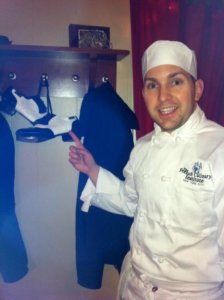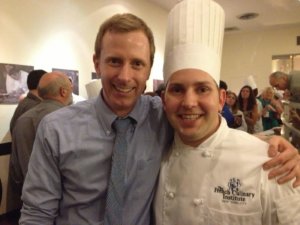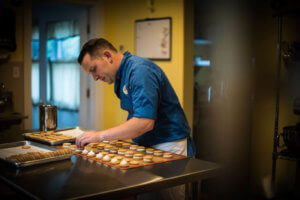Think all successful chefs have been donning their aprons since they could walk? Think again. The culinary and pastry worlds are full of successful chefs who came to the kitchen as a second or even third career.
Chef Steve Konopelski is just one example. Since starting his second career in food, he’s worked for a world-famous pastry chef, started multiple businesses, and created his own online show. And now, he’s a Chef Instructor at Auguste Escoffier School of Culinary Arts.
Explore his story, and discover why he thinks career changers can be so successful in the kitchen.
Starting a Career with an Expiration Date
Chef Steve always knew that he would need to figure out a “second act.” That’s because he was a dancer in his first career — a path with a notoriously short timeline.
Steve danced throughout his entire childhood, and attended a ballet conservatory. In 2001, he moved to New York City to become a professional dancer. While he had a successful dancing career, he knew that the very nature of his passion meant he couldn’t do it forever. “Dancing is emotionally and physically draining,” he said. It’s hard on the body, and dancers’ careers often end in their 30s, if not sooner. It’s also unstable, revolving around short-term shows and gigs. So after about 11 years as a working dancer, Steve knew it was time to explore other passions.

Changing Careers Means Facing Fears
Even before he was ready to make the shift to a new career, Chef Steve knew he wanted a more stable future with his husband, Rob.
“I was lucky enough to grow up on a farm where we grew and made our own food,” he said. “So when I was considering where I wanted to move for my retirement [from dancing], being in the kitchen was so comforting and familiar to me. And the actor side of me was drawn by the fact that food was now being turned into a form of entertainment.”
He also spent some time considering what he wanted his career trajectory to be. As a dancer, he knew that proper technique was fundamental to any career. And he wouldn’t be able to combine food with entertainment if he didn’t have that great technique. So in 2011, Steve retired from performing and enrolled at the French Culinary Institute.

Chef Steve hanging up his dancing shoes
Still, he had his concerns. The time between ending his dance career and entering culinary school was full of fear and doubt. “I turned off social media. I couldn’t go to any of the audition websites. I didn’t want to think, ‘If I had been in that audition room, would I have gotten the job instead?’”
“My first day of culinary school, I was petrified. And it just so happened that my Chef Instructor on my first day of school had been an alumni from Alvin Ailey [American Dance Theater]. I pulled her aside and I said, ‘I am having a really hard time with how to transition here at school. I don’t know who I am. How did this work for you?’”
“She said, ‘As a former dancer, you will excel in this industry. You understand the importance of muscle memory, you understand the importance of listening and replicating, you understand the importance of spatial awareness. Everything that you bring here is everything you already need to succeed in order to be a great chef.’ And from that moment on, culinary school was incredibly easy for me, because I realized that I wasn’t in a new space. Just the decor had changed.”
“You know yourself better than anybody else knows you. There’s always that voice deep down within you. A lot of times we’re too scared to listen to that voice because we’re comfortable or we don’t like change. But I think as long as you are always unapologetically true to yourself, you’ll never be led astray.”Steve Konopelski, Escoffier Online Pastry Chef Instructor and host of The Sweet Life of Steve

Chef Steve and his husband Rob at Steve’s culinary school graduation
Testing Out the Industry
After culinary school, Chef Steve dove head first into his new career. He worked at New York restaurants and bakeries to start building his experience, with a focus on beautiful cakes.
He also got the chance to work as assistant to James Beard Award-winning pastry chef Claudia Fleming. “I was just in absolute awe of everything that that woman did. I don’t think she knows how much of an impact she’s had on my career. I would just absorb all of this genius. I adored working for her. And then I felt it was time to spread my wings and fly and start our own stuff.”
Steve and his husband Rob moved to Maryland where they bought a Victorian house and turned it into a B&B. With the commercial kitchen onsite, they thought, “Why not do some catering?” And that foray led to baking high-end, couture wedding cakes for the local clientele. A stand-alone bakery soon followed, as well as selling baked goods on their front porch during the local farmer’s market days. They even trademarked their own specialty cookie, the Cannolio®.

Chef Steve working on the Cannolio®. Photo by Matt Simpkins Photography
Sound like a lot? It was. Soon, Chef Steve was feeling burnt out. He and Rob decided to let the B&B go and focus exclusively on the bakery. With his equilibrium regained, Steve could concentrate on the wedding cakes and bakery, and still enjoy his personal life.
Until, that is, COVID-19. While the bakery could have stayed afloat, the loss of staff put Steve back into hustle-mode.

One of Chef Steve’s wedding cakes
“Coming full circle to where I came from,” he says, “I was very content with the dance career that I had. I wanted to be the one that says when I’m done. I didn’t want the industry to say ‘You’re too old, we have no use for you anymore.’ I wanted to walk away on my terms, knowing that I had done everything that I wanted to and feeling good about that. And I did. And the same thing happened with the bakery. Could we have kept on going? Probably, but I was really happy with everything that we had accomplished.”
So Steve and Rob decided to close the bakery, which opened up some unexpected new opportunities.
The Student Becomes the Teacher (and the Entertainer Lives On)
Closing the bakery left Chef Steve at another crossroads. What would be next for this adaptable chef? How about teaching? Chef Steve became Chef Instructor Steve, and joined the online faculty at Auguste Escoffier School of Culinary Arts, where he shares his cake and confiserie skills with his students.
“I’m not an old chef,” he says. “I haven’t been around the culinary world forever. But seeing a fresh perspective with each one of these students is the most fascinating part of this job to me.”
He also used this time to try something new—creating his own YouTube show, The Sweet Life of Steve. “I wanted to be on television, but when the Food Network was calling me, it was just the competition-type shows.” While he did compete in season 2 of Food Network’s Holiday Baking Challenge (and reached the final episode), he didn’t want to do more competitions. “I want to be unapologetically me,” he says.
So he teamed up with some friends that run a production company, and they created their own show where Steve could be himself and share his skills his own way. “You can take the boy out of Broadway,” he says, “but you can’t take the Broadway out of the boy. I also do not feel that there is very good LGBTQ+ representation in the culinary world,” so this was his opportunity to fill the gap.
“I wanted to share some of my favorite recipes and techniques, and I wanted it to be fun.”Steve Konopelski, Escoffier Online Pastry Chef Instructor and host of The Sweet Life of Steve
Why Do Career Changers Do So Well in the Culinary World?
Chef Steve sees real advantages for those who transition into the culinary industry later in life. They bring a fresh perspective to a field often heavily influenced by tradition. They notice things that industry veterans may not, and ask insightful questions.
“When you walk in with 20 years experience doing something else, you’re not bringing in preconceived notions. Like the parsley that’s always on the side of the plate at a diner. Why do we do it? Who knows!”
Plus, career changers bring transferable skills. Those could be physical skills, like Chef Steve’s spatial awareness. Maybe they’re organizational skills from an office job, or maybe the person is highly detail-oriented from a previous career in the medical field. These will all be helpful skills in the culinary industry.
“The longer that you’ve been on this spinning ball we call earth, the more wisdom and experience you have, which you can translate into pretty much anything,” Chef Steve says. “So I think career changers can really be some of the most successful people in whatever they come to next, because they’re already bringing all of that specific life experience to the table.”
“You have to allow yourself the opportunity to have new dreams. That path might be scary at first, but it might end up being a much more glorious path than the one that you had been trudging on for so long.”Steve Konopelski, Escoffier Online Pastry Chef Instructor and host of The Sweet Life of Steve
Take a Chance on Something New
Starting a new career is exhilarating, but it can also be intimidating. Chef Steve is a testament to what can happen when you are true to who you are and dare to take a chance on something new. He’s a fantastic addition to the Escoffier teaching staff, and we can’t wait to see what he creates next!
If you’re considering a career change, let’s talk about how an education at Escoffier can help you translate your current skills into the world of culinary or pastry arts!
To learn more about careers in baking and pastry arts, try these articles next:

